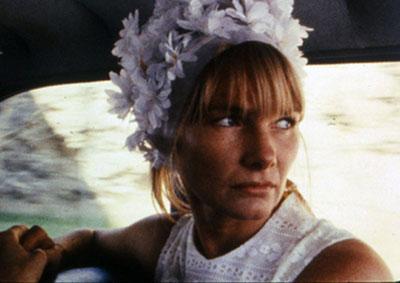"Wanda's somnambulent, nomadic journey plays out like a hazy dream rendered in 24 vintage Polaroids a second." - LA Weekly
Directed by Barbara Loden
Foundation for Filmakers/Bardene International Films, Inc. Producer: B. Loden. Screenwriter: B. Loden. Cinematographer: Nicholas, T. Proferes. Editor: N. Proferes. With: Michael Higgins, B. Loden, Frank Jourdano, Valerie Manches, Dorothy Shupenes. 35mm, color, 102 min.
Barbara Loden, at surface glance, might be the least likely candidate to have produced one of the absolute masterpieces of American cinema. Beginning her career as a nightclub dancer and pinup girl, she had to face not only class but gender discrimination throughout her life. By her own frank admission, she had been raised in an environment wherein a woman’s only chances for self-improvement were through attachment to a man. It’s precisely from these struggles that Wanda grew.
It’s hence ironic and perversely appropriate that Loden was, initially, known for her marriage to Elia Kazan and for her roles in his films Wild River (1960) and Splendor in the Grass (1961), and his stage production of After The Fall (1964). Loden subsequently withdrew from public life alongside Kazan before taking up the writer/director’s helm of Wanda, which is fittingly, her lasting cinematic legacy.
Now cited by Jonathan Rosenbaum as one of the 100 greatest American films ever made, Loden’s neo-realist gem centers on her brilliant performance as a rural Pennsylvanian housewife embarked upon a flight to nowhere, traveling through an American landscape of decrepit factories, two-lane wastelands and ratty motels. Dragged seemingly by the wind into a relationship with small-time crook Michael Higgins, Loden’s Wanda floats through her own life as if witness to it; a view of desperation filtered through a tinted windshield.
Her creative partner in the production was cinematographer/editor Nick Proferes, who, crucially, emerged from the then-vital tradition of cinema vérité. With its location shooting, existing light cinematography, long takes and extensive use of non-actors, Wanda functions at one level as pure documentary. Loden’s and Higgins’s brilliant acting performances are held in perfect balance by both the non-actors who surround them and Proferes’s photography of rural and small-town Pennsylvania. Proferes’s vérité origins ultimately fuse with Loden’s expert direction in one of the most authentic visions of middle America committed to screen.
UCLA’s new 35mm restoration is blown up directly from the previously lost 16mm camera rolls, and brings a sharper and truer rendition of Wanda’s unique 1970’s color palette than has previously been possible. Digital tools have been used to selectively repair damaged sequences in the original materials.
—Ross Lipman
Preserved in cooperation with Televentures Corp and Parlour Pictures from the original 16mm a/b rolls, a 35mm print, and the original 35mm and 16mm optical tracks. Laboratory services by Cinetech, Ascent Media, Audio Mechanics, and NT Picture and Sound. Special thanks to: David Block, Mimi Brody, Dave Cetra, James Gott, Marco and Larry Joachim, Shawn Jones, Leo Kazan, Dave Osterkamp, John Polito, Nicholas Proferes.






 Mobile Navigation
Mobile Navigation

